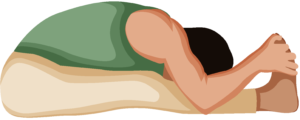Aerial Seated Forward Bend (Paschimottanasana)
Pose Overview
| Common Name | Aerial Seated Forward Bend |
| Traditional Sanskrit Name | Paschimottanasana |
| Sanskrit Name Pronunciation | pah-shih-moh-tuh-NAH-suh-nuh |
| Pose Difficulty | Intermediate |
| Drishti
Drishti is the gaze or visual focus point during yoga poses.
Learn more about Drishti |
Tip of the nose |
Aerial Seated Forward Bend, also known as "Paschimottanasana," is a seated yoga pose that can help to increase flexibility in the back, hips, and hamstrings. This pose is considered to be a moderate level pose that is suitable for most students. The pose is a variation of the traditional seated forward bend pose and is done with the support of an aerial hammock or silk. The use of the hammock allows the student to experience a deeper stretch and release tension in the body.
Benefits of Aerial Seated Forward Bend
Increases flexibility in the back, hips, and hamstrings Relieves tension in the back and shoulders Improves digestion Calms the mind
How to Enter Aerial Seated Forward Bend
Start by sitting in the center of your aerial hammock or silk, with the fabric hanging behind you. Bring your right hand behind your back and grasp the fabric. Slowly lean back, allowing the fabric to support your weight as you come into a forward bend. Keep your left hand on your left knee, and keep your back straight. Keep your head and neck relaxed, and breathe deeply.
How to Exit Aerial Seated Forward Bend
Slowly release the fabric and come back to a seated position Take a few deep breaths and release any tension from the body.
Common Aerial Seated Forward Bend Modifications & Variations
If you find it difficult to bend forward, you can use a folded blanket or cushion to support your hips. You can also use a strap to help you reach your feet. You can also try this pose with your legs crossed instead of straight.
Common Mistakes with Aerial Seated Forward Bend
Rounding the back Holding the breath Overstretching
Safety Guidance
Always use a secure and properly set up aerial hammock or silk for this pose. Be careful not to overstretch, and listen to your body's signals. If you have any medical conditions, consult with your doctor before practicing this pose.

